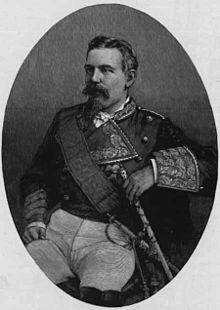Arsenio Martínez-Campos
Arsenio Martínez-Campos Antón (born December 14, 1831 in Segovia , Spain , † September 23, 1900 in Zarauz , Spain) was a Spanish general .
Life
Martínez-Campos was trained at the General Staff School in Madrid , which he left as a lieutenant , took part in the General Staff Leopoldo O'Donnells in 1859 in the Spanish-Moroccan War and was promoted to battalion commander in the same.
In 1864 he was sent to the army in Cuba with the rank of colonel , where he remained until 1870. Returning to Spain, he fought at the head of a brigade against the Carlist in the north, was deposed and arrested after the abdication of King Amadeus in 1873 for his hostile attitude towards the First Spanish Republic , but released again in 1874 and placed at the head of a division , with which he helped liberate Bilbao and was the first to move into the liberated city on May 1st.
He then commanded the third corps against the Carlist in the fighting at Estella (late June 1874). His bravery and his successes made him so popular with the army that at the end of 1874 he was able to proclaim Prince Alfons of Bourbon king in Sagunto .
Alfonso XII appointed him Captain General of Catalonia and Commander in Chief of the Northern Army; With the victory of Peña de Plata (March 1876) over the Carlist pretender Don Carlos (VII), he put an end to the third (and last) Carlist War and was promoted to General Captain of the Army.
In 1877 Martínez-Campos took command of Cuba to suppress the Cuban struggle for independence against Spain (1868–1898). In contrast to his predecessors (and his successors) he realized that the war against the guerrilla army of the Mambises could not be won militarily, only a political offensive promised success. Through a military offensive and concurrent concessions, especially to the Cuban sugar bourgeoisie ( Peace of Zanjón 1878), he managed to split the independence movement. At a meeting between the Cuban general Antonio Maceo and Martínez-Campos, Maceo declared that he would continue the war against Spain ( Protesta de Baragua ); a year later he had to give up the fight. Since the Spanish Prime Minister Cánovas de Castillo particularly refused the financial concessions, Martínez-Campos took over the leadership of the Spanish government in March 1879 to obtain the approval of his Cuban policy from the Cortes .

Since the Cortes refused this, Martínez-Campos resigned the presidium of the cabinet, allied himself with the constitutional, the 'dynastic opposition' under Sagasta , overthrew his opponent Antonio Cánovas del Castillo in 1881 and then took over the war ministry in the new government, which he retained until 1883. In 1887 he was appointed captain general of Madrid.
In 1889 he became captain general of Catalonia and survived an attack in Barcelona on September 24, 1893 . In November 1893 he was appointed commander-in-chief of the troops operating against the Kabyle forces in Melilla (→ First Rif War ). He could force the Kabyle to make peace and the Sultan of Morocco to pay war indemnity . His rigid crackdown on journalists brought about the overthrow of the Sagasta Ministry. A short time later he was sent to fight another uprising that broke out in Cuba. This time the uprising could not be suppressed and the government did not agree to the necessary reforms. Martínez-Campos was therefore recalled in January 1896 and since then has sat in the Senate , whose presidency he took over in 1899 until his death.
Martínez-Campos died on September 23, 1900 in Zarauz. His son Ramón Martínez de Campos y Rivera was born on October 26, 1891 by Alfonso XIII. in respect of the services of his father raised to the hereditary Duke of Seo de Urgel .
literature
- Arsenio Martínez-Campos. In: Meyers Konversations-Lexikon Bibliographisches Institut, 6th edition, 1905–1909
Web links
Footnotes
- ↑ Spanish atentado contra el general Martínez Campos , eg see. B. Terrorism in Barcelona and Its Impact on Spanish Politics 1904-1909 .
| personal data | |
|---|---|
| SURNAME | Martínez-Campos, Arsenio |
| ALTERNATIVE NAMES | Martínez-Campos Antón, Arsenio (full name) |
| BRIEF DESCRIPTION | Spanish general |
| DATE OF BIRTH | December 14, 1831 |
| PLACE OF BIRTH | Segovia , Spain |
| DATE OF DEATH | September 23, 1900 |
| Place of death | Zarauz , Spain |
